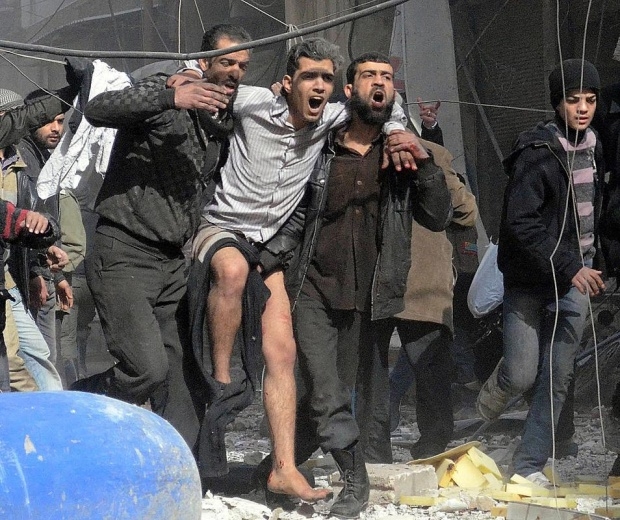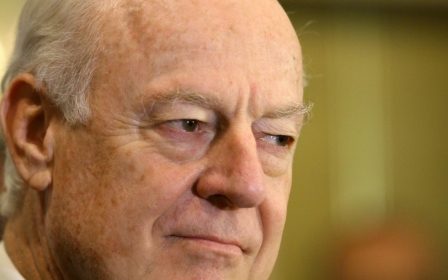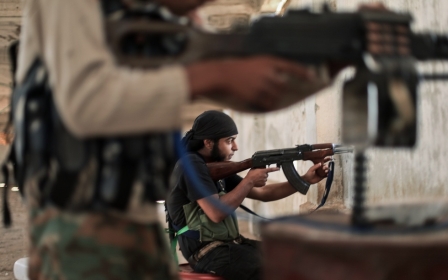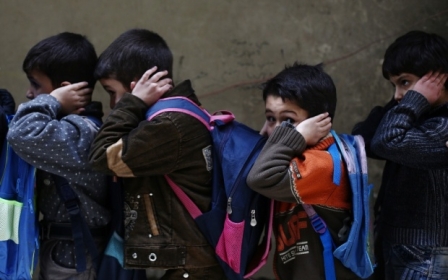Why is a ceasefire so difficult in Aleppo?

All the talk on Syria recently in top diplomacy circles has been about the importance of establishing a ceasefire, or a “freeze” in fighting in and around Aleppo city. Such a ceasefire would not only provide a welcome respite for a beleaguered civilian population in the form of aid convoys and a halt to shelling which has claimed thousands of lives, it would also establish an important stepping stone on the way to any broader final settlement of the conflict. In other words, a ceasefire is in the best interests of the people, and has broad - if sceptical - support across both rebel-held and regime-held areas.
Surely then no one can be against a freeze proposal, and Syria’s embattled president has welcomed it, offering a six-week suspension of air and artillery strikes – not such a significant concession considering they are already much reduced after achieving their main objective: clearing out the rebel east of the city of most of its inhabitants.
But why then has the main body of the Syrian opposition in exile - the Syrian National Coalition (SNC) - as well as all the major rebel groups operating in Aleppo come out and flatly rejected it?
The reasons are twofold; stated and unstated.
The official reason given is that a ceasefire would allow the regime to transfer its forces and military assets to other fronts, especially the southern front where it has recently made significant gains backed by its Hezbollah ally. This is also the view held by the main powers that back the rebels, who believe that only continued military pressure will force the Syrian regime to make concessions in any negotiated political solution to the war. Even though this policy has yet to bear fruit after almost three years of war, they do not envision any other, as a continuation of the regime in its present form is unacceptable to them, neither is any let up in pressure against it. To that end, a prolonged war of attrition may achieve what a quick and intense campaign failed to do: convince the Syrian regime and the powers behind it to sue for peace under more favourable terms.
Another reason, sometimes brought up, is that a ceasefire in Aleppo would be akin to a capitulation, such as what happened in the old quarter of Homs, but this is misleading. The circumstances are completely different; in Homs, the rebel fighters were besieged and starved for months, whereas in Aleppo they enjoy direct supply lines to the Turkish border just a short distance away. Furthermore, the rebel factions operating in Aleppo are far stronger than those in Homs, and boast an array of seasoned Islamist and jihadist groups that include both local and foreign fighters. Those two reasons are precisely why a determined regime offensive a couple of weeks ago stalled after failing to make any headway in cutting off rebel territory and supply lines.
However, the unstated reasons behind the rebel rejection of a freeze proposal are the most significant and require a closer view of the dynamics on the ground. Those same dynamics are what will continue to hinder any meaningful ceasefire proposals in the future, too.
First off is the presence of powerful jihadist groups who hold strategic military fronts and exercise real power and influence over the flow of battle. Those groups have the final say over any deal, and their veto is a given, as their ideology - incompatible with any diplomacy or negotiations - sees only an armed holy struggle to set up Islamic emirates. They are incapable of any compromise, even short term, and have actively scuttled local ceasefires around Damascus, like in the Yarmouk camp. Notably, the areas which don’t have a significant jihadist influence are the ones where ceasefires have successfully taken hold.
Their doctrine is either war or victory, and their continued presence and domination on the Syrian scene is the main reason why any temporary truces or an eventual political settlement to the conflict is almost assured of failure. Getting rid of them will not be easy, and may in fact prove impossible. While the US-led coalition has launched limited airstrikes against the most potent of those groups, the al-Qaeda linked Jabhet al-Nusra and Ahrar al-Sham, they have only been targeted at cells suspected of plotting against Western interests. There is a tacit recognition that weakening those jihadist groups will automatically give the Syrian regime and its allies the upper hand in the conflict.
Another major reason behind the difficulty of ceasefires is the nature of civil war itself; the “warlordism” aspect. Previously obscure individuals, usually from humble backgrounds, rose to positions of prominence, power and wealth through years of war. They control militias, resources, territory and have say over the lives of hundreds of thousands of people. It will not be easy to convince them to give all that up for the greater good, unless they are guaranteed a slice of any eventual pie. In fact, many of those warlords have a vested interest in the indefinite continuation of war, even though very often their only real role in it is inter-factional fighting over control of territory. Warlordism is almost exclusive to the rebels, but powerful loyalist militia who have profiteered from smuggling, looting and racketeering on strategic checkpoints are also an issue, even though their commanders are easier to bring under the fold of central decision-making.
Breaking the cycle of violence and the self-perpetuating momentum of war is a threat to Syria’s entrenched warlords, as it would directly translate to a loss of influence and power. As people gradually begin to adjust to a semblance of normal life, they will reject a return to war. A cessation of fighting means many of the millions of displaced will begin returning home to areas which were previously uninhabitable. The more they rebuild and put their lives back together, the more willing they will be to “bury the hatchet” of vengeance and the burden of blood. This popular pressure in rebel zones will convince many fighters to lay down their arms, and many more to respect the truce and the wishes of their community.
In effect, the longer a successful ceasefire takes hold, the more difficult it will be to convince people to return to war, especially an unpopular civil war like that in Syria. Prolonged peace will also mean that people in rebel areas, defined by a lack of basic services and rule of law, will begin gravitating back to central state control, which is better able to provide those necessities in the absence of any coherent or viable rebel or opposition alternative. This will further weaken the rebel’s grip on their areas, and strengthen the hand of the ruling regime. In that sense, pockets of stability and peace in times of civil war are always to the advantage of the state, and this is the real reason behind the rejection of the freeze proposals.
Even though ceasefires and an end to war is what the Syrian people most yearn for, it seems to be the last consideration of those who fight in their name and those that back them. War in Syria is an end in itself, it would appear.
- Edward Dark is MEE's Aleppo-based columnist and writes under a pseudonym.
The views expressed in this article belong to the author and do not necessarily reflect the editorial policy of Middle East Eye.
Photo: Two men struggle to help a wounded man to safety (AA)
Middle East Eye propose une couverture et une analyse indépendantes et incomparables du Moyen-Orient, de l’Afrique du Nord et d’autres régions du monde. Pour en savoir plus sur la reprise de ce contenu et les frais qui s’appliquent, veuillez remplir ce formulaire [en anglais]. Pour en savoir plus sur MEE, cliquez ici [en anglais].





